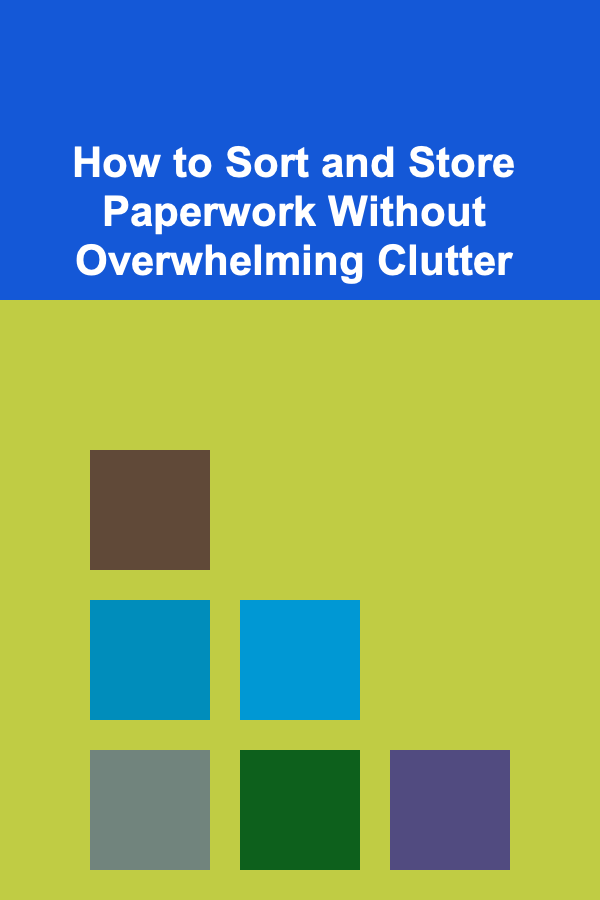
Eco-Friendly Alternatives for Cutting Down on Household Paper Products
ebook include PDF & Audio bundle (Micro Guide)
$12.99$11.99
Limited Time Offer! Order within the next:

In today's world, sustainability and eco-conscious living are becoming increasingly important. One area where many households can make a significant impact is by reducing their consumption of paper products. Paper products such as paper towels, napkins, toilet paper, and tissues contribute to deforestation, pollution, and excessive waste. By adopting eco-friendly alternatives, you can reduce your environmental footprint while maintaining the convenience of daily life. This guide will explore practical, actionable strategies to cut down on household paper products and replace them with more sustainable options.
Replace Paper Towels with Reusable Cloths
Paper towels are one of the most commonly used disposable paper products in households. They are convenient for cleaning up spills, wiping counters, and drying hands, but they come at a significant environmental cost. According to the Environmental Protection Agency (EPA), the average American household uses more than 100 rolls of paper towels annually.
Eco-Friendly Alternative: Reusable Cloth Towels
Instead of using paper towels, switch to reusable cloth towels. Microfiber cloths, cotton towels, or old t-shirts can be great alternatives. These options are washable, durable, and can be used repeatedly, reducing waste. You can keep a few cloth towels in the kitchen, bathroom, and around the house for quick cleaning tasks. Microfiber cloths, in particular, are highly absorbent and can clean effectively without the need for harsh chemicals.
Benefits:
- Reduces the need for constant repurchasing of paper towels.
- Saves money in the long run.
- Cloth towels are more absorbent and versatile than paper towels.
- Helps to significantly reduce waste that would otherwise end up in landfills.
Tip:
Keep a dedicated basket or hamper for dirty towels to make it easy to toss them in the laundry without cluttering your home. Wash them regularly with eco-friendly detergent to maintain cleanliness.
Switch to Reusable Napkins
Disposable paper napkins are another household staple that adds up over time. While they are convenient for meals, they are often used just once and then thrown away.
Eco-Friendly Alternative: Cloth Napkins
Investing in reusable cloth napkins is an excellent way to cut down on disposable paper products. Cloth napkins come in a variety of colors, designs, and fabrics, making them a stylish and functional addition to your home. You can use cloth napkins for family meals, parties, and even casual dining.
Benefits:
- Can be washed and reused multiple times.
- Adds a touch of elegance to meals.
- Reduces the need for constant repurchasing of paper napkins.
- Saves money over time while promoting sustainability.
Tip:
To make it easier to use cloth napkins, have a dedicated drawer or storage area to keep them neatly folded and readily accessible. Consider choosing cloth napkins made from natural fibers like cotton or linen, as they are both durable and biodegradable.
Use Bidets Instead of Toilet Paper
Toilet paper is one of the most common paper products used in households, with millions of rolls being used daily. The production of toilet paper requires a large amount of water, energy, and raw materials, contributing to deforestation and pollution.
Eco-Friendly Alternative: Bidet Toilet Seats
A bidet is an excellent alternative to toilet paper, as it uses water to clean instead of paper. Bidets have been used for centuries in many parts of the world, and their popularity is growing in the United States and other countries as people seek more sustainable and hygienic alternatives to toilet paper. Bidet toilet seats or standalone bidet units can be easily installed in most bathrooms.
Benefits:
- Reduces or eliminates the need for toilet paper.
- More hygienic and gentle on the skin.
- Saves money over time since you won't need to buy toilet paper regularly.
- Significantly reduces paper waste, helping to conserve natural resources.
Tip:
If you're hesitant about using a bidet, start with a simple bidet attachment that can be installed onto your existing toilet. Many models are affordable and easy to set up, offering the same benefits as a full bidet unit.
Opt for Bamboo or Recycled Paper Products
While reducing paper usage is ideal, some situations may still require the use of paper products, such as tissues and toilet paper. When this is the case, it's important to choose eco-friendly options that have a lower environmental impact.
Eco-Friendly Alternative: Bamboo and Recycled Paper Products
Bamboo is a highly sustainable material because it grows quickly, requires little water, and doesn't require pesticides or fertilizers. Many brands now offer toilet paper, tissues, and paper towels made from bamboo. Alternatively, you can opt for paper products made from recycled paper, which helps reduce deforestation and the need for virgin wood pulp.
Benefits:
- Bamboo is a fast-growing, renewable resource.
- Recycled paper products help reduce waste and conserve trees.
- Both options are biodegradable and compostable.
Tip:
Look for certifications like FSC (Forest Stewardship Council) or Cradle to Cradle when choosing recycled paper products. These certifications ensure that the products meet high environmental and ethical standards.
Choose Digital Options for Paper Documents
In many households, paper is used for a variety of purposes such as printing documents, bills, and even shopping lists. While the use of paper for documentation may seem unavoidable, there are eco-friendly alternatives that can reduce paper consumption in this area as well.
Eco-Friendly Alternative: Digital Documents
Switching to digital formats for documents and notes can significantly reduce the need for paper. Use email for communication, store documents on cloud platforms, and take notes digitally on your phone, tablet, or computer. You can also subscribe to e-billing services to reduce paper waste from bills and statements.
Benefits:
- Reduces paper waste and clutter.
- Saves trees and natural resources.
- Cuts down on ink and other printing supplies.
- Makes it easier to access, organize, and share documents.
Tip:
Consider using digital notetaking apps, document scanners, and cloud storage platforms to organize your documents and reduce reliance on paper. Many apps also have features that allow you to sign documents digitally, eliminating the need for printed signatures.
Invest in Cloth Diapers and Wipes
For families with young children, disposable diapers and wipes can generate a significant amount of waste. These products are not biodegradable and can take hundreds of years to decompose in landfills.
Eco-Friendly Alternative: Cloth Diapers and Wipes
Cloth diapers and wipes are a sustainable alternative to their disposable counterparts. Modern cloth diapers are easy to use, comfortable, and come in a variety of sizes and designs. Paired with reusable cloth wipes, they can significantly reduce household waste and save money over time.
Benefits:
- Cloth diapers can be reused for multiple children, saving money.
- Eliminates the waste associated with disposable diapers and wipes.
- Reduces exposure to harsh chemicals found in disposable diapers and wipes.
Tip:
Invest in a good-quality cloth diapering system, including liners, wipes, and storage bags. Be sure to wash them regularly and follow the care instructions to maintain their durability.
Encourage Sustainable Practices in Your Home
Finally, the key to reducing paper product consumption lies in cultivating sustainable habits within your home. Educating your family members about the benefits of using eco-friendly alternatives and making small changes to daily routines can create a lasting impact.
Eco-Friendly Practices:
- Use reusable shopping bags instead of paper or plastic bags.
- Opt for reusable food storage containers instead of disposable plastic wraps or bags.
- Encourage family members to bring their own reusable coffee cups and water bottles.
- Promote the use of digital notes, calendars, and shopping lists to reduce paper waste.
Benefits:
- Instills eco-friendly habits that benefit the environment.
- Reduces the amount of waste produced in the household.
- Saves money on disposable paper and plastic products.
Tip:
Make eco-friendly alternatives easy to access and encourage the use of sustainable options throughout the home. The more convenient these alternatives are, the more likely your family members will adopt them into their daily routines.
Conclusion
Reducing your reliance on household paper products is one of the simplest yet most impactful steps you can take toward a more sustainable lifestyle. By switching to reusable alternatives, opting for eco-friendly paper products, and incorporating sustainable habits into your home, you can significantly reduce waste and conserve natural resources. These small changes, when combined, create a ripple effect that can lead to a cleaner, healthier planet for future generations. Start making the shift today, and enjoy the benefits of a more eco-conscious and waste-free home.

How to Make Your Home Feel Like a Winter Retreat for the Holidays
Read More
How to Sort and Store Paperwork Without Overwhelming Clutter
Read More
How to Soundproof Your Walls Without Professional Help
Read More
How to Use Hooks and Pegboards for Toy Storage
Read More
Why Organizing Your Email Subscriptions Can Reduce Clutter
Read More
How To Master Robot Localization Without GPS
Read MoreOther Products

How to Make Your Home Feel Like a Winter Retreat for the Holidays
Read More
How to Sort and Store Paperwork Without Overwhelming Clutter
Read More
How to Soundproof Your Walls Without Professional Help
Read More
How to Use Hooks and Pegboards for Toy Storage
Read More
Why Organizing Your Email Subscriptions Can Reduce Clutter
Read More